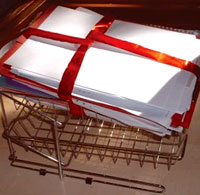 Thanks to the Sixth Ministerial Conference on Trade in Hong Kong, the past week in the Nepali business press belonged to a diverse conversation about Nepal and international trade. As days progressed, two strands of that conversation became clearer.
Thanks to the Sixth Ministerial Conference on Trade in Hong Kong, the past week in the Nepali business press belonged to a diverse conversation about Nepal and international trade. As days progressed, two strands of that conversation became clearer. One belonged to NGO activists. They were determined to make their voices heard to slow down, for instance, a possible drop in the income of Nepal's rice farmers due to easier imports of cheaper foreign rice. The other voice was that of free-market adherents. They repeated that trade is good for Nepal and that anyone who advocates protectionism in any form for any reason is practicing a dying 'ism'.
To most concerned citizens, it's likely that both sides sounded sincere but unpersuasive. That's because, on one hand, with a booming remittance economy and declining contributions of agriculture (39 per cent) to GDP, whether cheaper rice from abroad will necessarily make all our farmers poorer stays a debatable issue. On the other hand, in today's public sphere it is not enough to merely chant the usual free market shibboleths about trade when its imperfections are all too plain for all to see.
Yes, trade is important. But despite all the hoopla, it accounts for only 10 per cent of our annual national income. And given that average growth rates of our flagship export items such as carpets, garments, pashmina and major commodities have gone down markedly in recent years, the time has come to start shifting the slant of discussion to what changes in policies would lead to easier and more trade.
In that context, if one shifts gears from Hong Kong to Kathmandu these questions come up: if trade is so important, why aren't there many Nepali entrepreneurs engaged in it? More specifically, how difficult is it to engage in international trade in Nepal?
According to the International Finance Corporation's Doing Business 2005, an annual publication that compares business regulations in 155 countries, Nepal ranks 105 when it comes to the ease of trading across borders. A Nepali entrepreneur, on average, needs seven different documents, 12 different signatures and one and a half months to export goods. Likewise, to import goods, she needs 10 documents, 24 signatures and 38 days. Needless to say, the more developed an economy is, the lower these figures are for its trade-related transactions. Germany, for instance, requires only one signature, four documents and a mere six days each for both export and import.
But in Nepal's case, these relatively high figures imply three things. First, our traders spend a lot of time dealing with our government bureaucracies - filling out forms, securing permissions, collecting signatures and waiting and waiting for the goods to be shipped out. This leaves them with less time to interact with foreign clients, figure out changing demands and sell goods and services in a timely manner at internationally competitive prices.
econd, the more time they spend at government offices, the more likely it is that the more impatient among them are going to indulge in the supply side of corruption to speed up transactions. And third, these form-filling rituals, long entrenched as mechanisms of control rather than as tools of facilitation, indicate the low level of trust that the government has in Nepal's private sector community. None of these help the country's case for more and easier trade in times ahead.
So yes, we can wax eloquent about the benefits of trade. We can also lobby to change international regulations on trade. But as long as we fail to do our homework to ask the Finance Minister to scratch out a number of unnecessary bureaucratic steps currently in place for trading, our economy will never get to enjoy the full potential of more of its citizens engaging in wider international trade.



